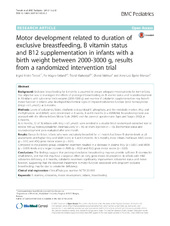| dc.contributor.author | Torsvik, Ingrid Kristin | en_US |
| dc.contributor.author | Ueland, Per Magne | en_US |
| dc.contributor.author | Markestad, Trond | en_US |
| dc.contributor.author | Midttun, Øivind | en_US |
| dc.contributor.author | Monsen, Anne-Lise Bjørke | en_US |
| dc.date.accessioned | 2016-08-11T12:51:52Z | |
| dc.date.available | 2016-08-11T12:51:52Z | |
| dc.date.issued | 2015-12-18 | |
| dc.Published | BMC Pediatrics 2015, 15(1):218 | eng |
| dc.identifier.issn | 1471-2431 | |
| dc.identifier.uri | https://hdl.handle.net/1956/12554 | |
| dc.description.abstract | Background: Exclusive breastfeeding for 6 months is assumed to ensure adequate micronutrients for term infants. Our objective was to investigate the effects of prolonged breastfeeding on B vitamin status and neurodevelopment in 80 infants with subnormal birth weights (2000-3000 g) and examine if cobalamin supplementation may benefit motor function in infants who developed biochemical signs of impaired cobalamin function (total homocysteine (tHcy) > 6.5 μmol/L) at 6 months. Methods: Levels of cobalamin, folate, riboflavin and pyridoxal 5´-phosphate, and the metabolic markers tHcy and methylmalonic acid (MMA), were determined at 6 weeks, 4 and 6 months (n = 80/68/66). Neurodevelopment was assessed with the Alberta Infants Motor Scale (AIMS) and the parental questionnaire Ages and Stages (ASQ) at 6 months. At 6 months, 32 of 36 infants with tHcy > 6.5 μmol/L were enrolled in a double blind randomized controlled trial to receive 400 μg hydroxycobalamin intramuscularly (n = 16) or sham injection (n = 16). Biochemical status and neurodevelopment were evaluated after one month. Results: Except for folate, infants who were exclusively breastfed for >1 month had lower B vitamin levels at all assessments and higher tHcy and MMA levels at 4 and 6 months. At 6 months, these infants had lower AIMS scores (p = 0.03) and ASQ gross motor scores (p = 0.01). Compared to the placebo group, cobalamin treatment resulted in a decrease in plasma tHcy (p < 0.001) and MMA (p = 0.001) levels and a larger increase in AIMS (p = 0.02) and ASQ gross motor scores (p = 0.03). Conclusions: The findings suggest that prolonged exclusive breastfeeding may not provide sufficient B vitamins for small infants, and that this may have a negative effect on early gross motor development. In infants with mild cobalamin deficiency at 6 months, cobalamin treatment significantly improvement cobalamin status and motor function, suggesting that the observed impairment in motor function associated with long-term exclusive breastfeeding, may be due to cobalamin deficiency. | en_US |
| dc.language.iso | eng | eng |
| dc.publisher | BioMed Central | eng |
| dc.rights | Attribution CC BY | eng |
| dc.rights.uri | http://creativecommons.org/licenses/by/4.0 | eng |
| dc.subject | B vitamins | eng |
| dc.subject | Cobalamin | eng |
| dc.subject | motor development | eng |
| dc.subject | infants | eng |
| dc.subject | breastfeeding | eng |
| dc.title | Motor development related to duration of exclusive breastfeeding, B vitamin status and B12 supplementation in infants with a birth weight between 2000-3000 g, results from a randomized intervention trial | en_US |
| dc.type | Peer reviewed | |
| dc.type | Journal article | |
| dc.date.updated | 2016-02-25T14:29:52Z | |
| dc.description.version | publishedVersion | en_US |
| dc.rights.holder | Copyright 2015 The Authors | |
| dc.identifier.doi | https://doi.org/10.1186/s12887-015-0533-2 | |
| dc.identifier.cristin | 1342896 | |

